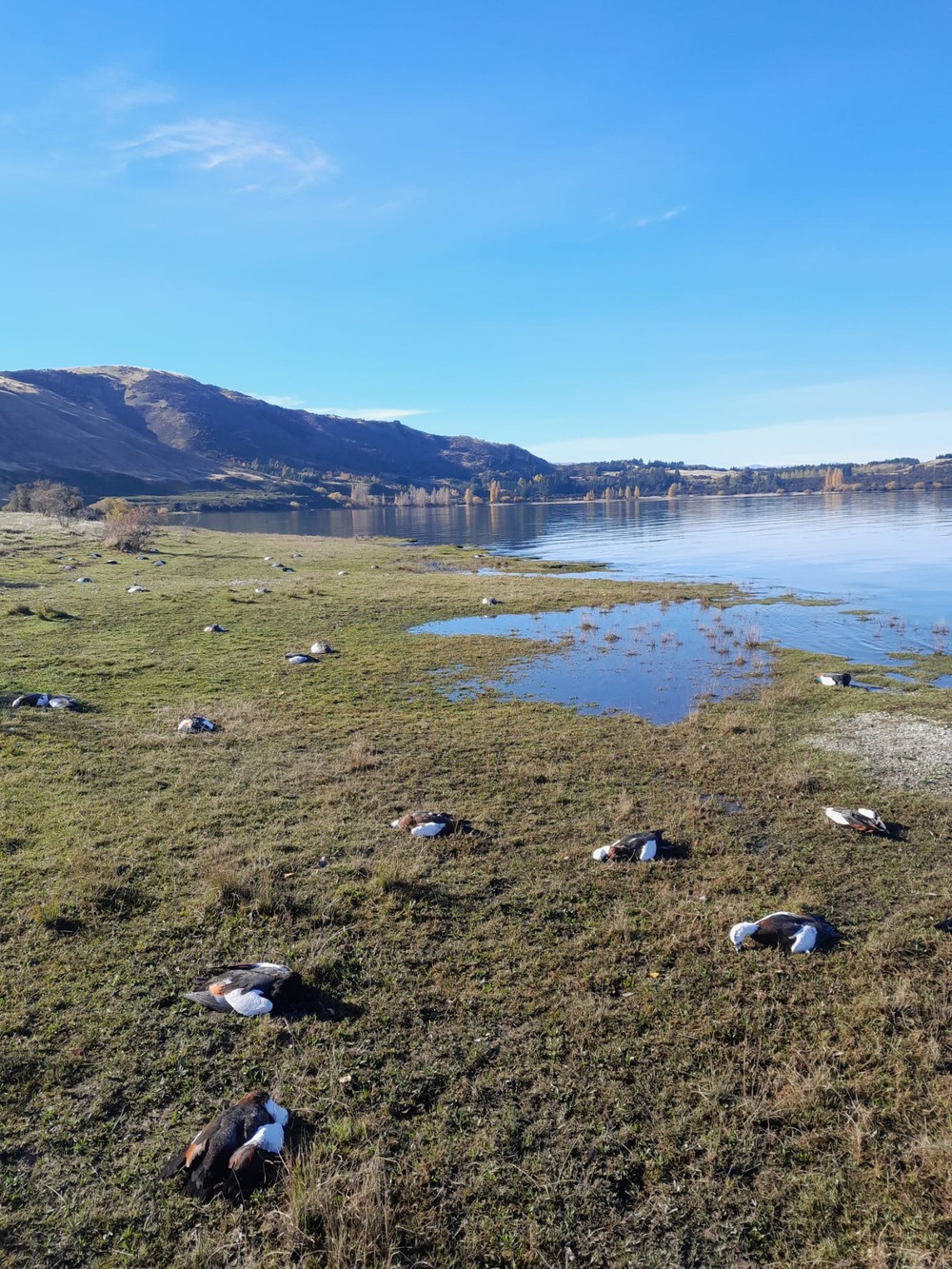MPI accused of not thoroughly investigating bird deaths
Sue Wards
22 May 2024, 2:10 AM
 Dead birds collected by a Wānaka woman at Dublin Bay last month. PHOTO: Supplied
Dead birds collected by a Wānaka woman at Dublin Bay last month. PHOTO: SuppliedOtago and Southland Fish & Game Councils have accused the Ministry of Primary Industries (MPI) of failing to complete a thorough investigation into mass bird deaths in Wānaka last month.
About 100 birds, including 85 native paradise shelduck, were found dead in Dublin Bay last month.
Fish & Game said it was “dismayed” that MPI had elected not to conduct further testing of the birds after its biosecurity group ruled out exotic disease as the cause of death.
Read more: ‘Exotic disease’ did not kill birds
Otago Fish & Game chief executive Ian Hadland said Fish & Game suspects “the insecticide diazinon is to blame for recent mass bird mortalities at Wānaka and near Te Anau, but we need this confirmed”.
“I would have thought MPI would be as interested as us in confirming the cause of death, but unfortunately they have walked away. It’s like they don't want to know,” he said.
A Wānaka woman who collected about 20 dead birds from Dublin Bay told the Wānaka App she was told by a vet (outside of Wānaka) contracted by MPI that three birds which she had given him to test had died from “poisoning with organophosphates”.
Organophosphates are an active ingredient in insecticides.
The woman, who wished to remain anonymous, said the vet had advised her a farmer in the Dublin Bay area had been spoken to and admitted using organophosphates to eradicate grass grub for crop maintenance.
“As poisoning birds is illegal, I asked what action may need to be taken and he said that was a matter for MPI or Fish & Game to decide on,” she said.
She said the vet explained that organophosphates remain in the food chain, meaning that birds which eat grass grubs would be poisoned, as would other animals which ate the poisoned birds.
Fish & Game said it would now test samples of dead birds from both incidents in Otago and Southland.

Dead paradise shelducks litter the shoreline at Dublin Bay last month. PHOTO: Fish & Game
Ian said it was “unacceptable that a not-for-profit organisation like Fish & Game has to use licence holder funds to mop up an incomplete investigation by a large government department such as MPI”.
In Te Anau, 64 dead paradise shelducks were discovered and further bodies were seen in an adjacent paddock on the foreshore on April 4.
In a separate incident, a concerned landowner contacted Southland Fish & Game, upset that he had accidentally poisoned shelduck through application of diazinon.
“It’s clear from one of the farmers who contacted Fish & Game that this product is extremely toxic to birds, so to have the agency responsible deliberately ignore the risks is abhorrent,” Southland Fish & Game manager Zane Moss said.
Diazinon is a registered insecticide used by the New Zealand agricultural industry. It is administered by MPI under the Agricultural Compounds and Veterinary Medicines Act 1997. The incesticide has been banned from agricultural products in the European Union since 2007.

MPI Biosecurity New Zealand deputy director-general Stuart Anderson said toxicology testing is not in MPI’s remit. PHOTO: Supplied
MPI Biosecurity New Zealand deputy director-general Stuart Anderson told the Wānaka App MPI had discussed with Fish & Game that its role was exotic disease testing (which it is funded to provide) and that the MPI laboratory would not do toxicology testing.
“Our core role is to investigate and respond to biosecurity risks threatening our primary industries and support our country by providing evidence of freedom status for market access,” Stuart said today (Wednesday May 22).
MPI confirmed it contacted other laboratories “to see if they were able to do the testing that Fish & Game want[s] to do, and we offered to assist them by providing them with appropriate samples for toxicology testing”.
MPI animal welfare compliance has an investigation open to determine if there have been any breaches of the animal welfare act in relation to the death of the birds, an MPI spokesperson added.
The Environmental Protection Agency (EPA) is phasing out pesticides containing prothiofos, terbufos, fenamiphos, methamidophos and diazinon.
“It is important that users of these products familiarise themselves with the label and follow directions,” the spokesperson said.






